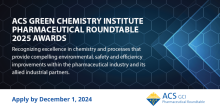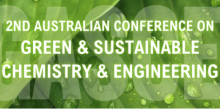The Connection Between Chemistry and Social Justice – Webinar
How is chemistry connected to social justice? Join the ACS GCI's Sederra Ross, Ph.D. for a webinar on Tuesday, November 13th from 2-3 p.m. which will delve into chemical innovations and green chemistry principles that address environmental inequalities which disproportionately impact marginalized communities, ensuring healthier lives and sustainable futures for all.







